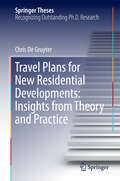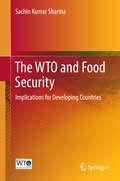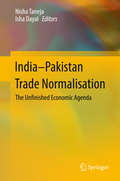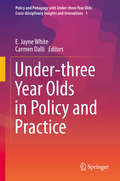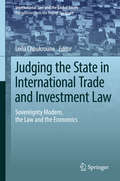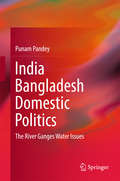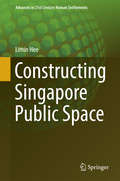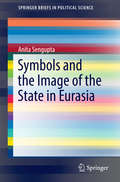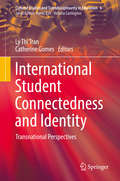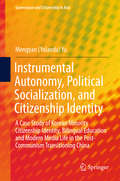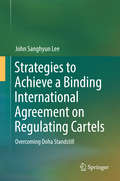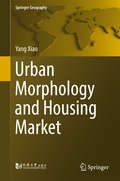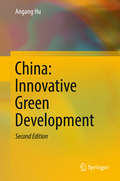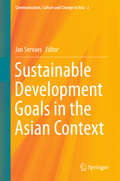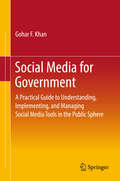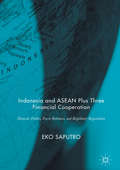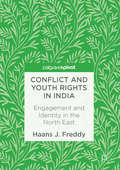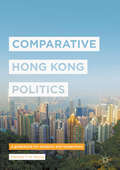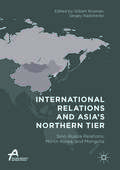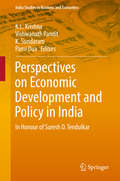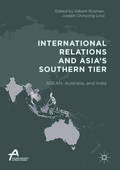- Table View
- List View
Travel Plans for New Residential Developments: Insights from Theory and Practice
by Chris De GruyterThis thesis explores the use of travel plans for new residential developments as a tool for managing car use and encouraging the use of more sustainable forms of transport. It provides coverage of the scale of travel planning practice for new developments, industry perspectives on their development and implementation, and an assessment of their quality and effectiveness. It combines implementation theory and planning enforcement theory to identify opportunities to enhance the effectiveness of travel plans for new residential developments and to guide future travel planning practice. This thesis is useful and will appeal to both researchers and practitioners involved in transport planning for new residential developments.
China’s Foreign Aid: 60 Years in Retrospect (Research Series on the Chinese Dream and China’s Development Path)
by Hong Zhou Hou XiongThis book analyzes the changes in and development of China's Foreign Aid Policy and Mechanisms over the past 60 years. It offers readers a thorough introduction to China's Aid to Africa; its Aid to Southeast Asian Countries; its Aid Policy Toward Central Asian Countries; and its Aid to Latin America and the Caribbean Region, as well as their respective influence. Combining field research and surveys at the grass-roots level, the book argues that China's foreign aid policy is intended to help other countries and has changed the strategic pattern of Western countries imposing blockades on New China, and has thus played a key role in expanding and strengthening China's economic and political ties with many developing countries, restoring its legitimate seat in the United Nations and promoting the cause of cooperation with regard to international development. Focusing on concrete examples rather than abstruse theories, the book further argues that foreign aid requires practical policies, suitable expertise and technologies; at the same time, international development - a field largely overlooked by scholars of international relations - can offer profound principles to shape international relations and foreign aid.
The WTO and Food Security
by Sachin Kumar SharmaThis book examines the public stockholding policies of selected developing countries from the perspective of WTO rules and assesses whether the provisions of the Agreement on Agriculture (AoA) could hamper these countries' efforts to address the challenges of food security. Further, it highlights the need to amend the provisions of the AoA to make WTO rules just and fair for the millions of people suffering from hunger and malnutrition in developing countries. This book highlights that 12 countries namely China, Egypt, India, Indonesia, Jordan, Kenya, Morocco, Pakistan, Tunisia, Turkey, Zambia and Zimbabwe are facing or will face problems in implementing the food security policies due to the provisions under AoA. These provisions need to be amended for permitting developing countries to address hunger and undernourishment. Progress in WTO negotiations on public stockholding for food security purposes are also discussed and analysed. The findings of this study greatly benefit trade negotiators, policymakers, civil society, farmers groups, researchers, students and academics interested in issues related to the WTO, agriculture and food security.
India-Pakistan Trade Normalisation
by Nisha Taneja Isha DayalThis book explores the unfinished India-Pakistan Trade normalisation agenda (building upon the themes covered in the book "India-Pakistan Trade: Strengthening Economic Relations" published by Springer in 2014) and discusses the steps that must be undertaken in order to move the bilateral engagement forward. Given the commencement of bilateral state-level talks and the Indian government's emphasis on South Asian integration, it adds impetus to the trade liberalisation process, while also providing essential recommendations for policymakers in both countries. The unfinished agenda faces obstacles such as the list of items for which export from India to Pakistan continues to be restricted; lack of land borders and seamless cross-border transport services, which hampers the realisation of trade potential; negative reporting in the media, which influences traders' perceptions; and the continued occurrence of informal trade resulting from inadequacies of formal trade relations. The book examines various sectors, including the agricultural, textiles, automotive and pharmaceutical industries, given their predominance on the list of restricted items for bilateral trade. It also covers studies on unconventional and under-researched themes concerning informal trade, informational barriers to India-Pakistan trade, and opening new land borders for trade - all of which can play a facilitating role in realizing the untapped trade potential between India and Pakistan. The book also includes the second round of the India-Pakistan trade perception survey, which identifies impediments to India-Pakistan bilateral trade and assesses the change in traders' perceptions since the first round of the survey, which was published in 2014.
Under-three Year Olds in Policy and Practice (Policy and Pedagogy with Under-three Year Olds: Cross-disciplinary Insights and Innovations)
by E. Jayne White Carmen DalliThe first book in the series Policy and Pedagogy with Under-three year olds: Cross Disciplinary insights and innovations establishes a path for the much-needed examination of the experiences of infants and toddlers in contemporary educational settings across the globe. Bringing together internationally renowned scholars in the field, it starts a series of discussions about the positioning of under-three year olds in contemporary practice and policy contexts. It takes an in-depth look at what this means for our understanding of under-three year olds and those who share their worlds. Featuring some of the most important contemporary topics in this pedagogical domain, such as care, well-being, belonging, professionalism and status, the contributors offer a kaleidoscope of perspectives for contemplating the new normality of very young children living their lives in group-based early childhood settings, and what gives rise to their current realities. It also explores some important policy directions and trends.
Judging the State in International Trade and Investment Law
by Leïla ChoukrouneThis book addresses concerns with the international trade and investment dispute settlement systems from a statist perspective, at a time when multilateralism is deeply questioned by the forces of mega-regionalism and political and economic contestation. In covering recent case law and theoretical discussions, the book's contributors analyze the particularities of statehood and the limitations of the dispute settlement systems to judge sovereign actors as autonomous regulators. From a democratic deficit coupled with a deficit of legitimacy in relation to the questionable professionalism, independence and impartiality of adjudicators to the lack of consistency of decisions challenging essential public policies, trade and investment disputes have proven controversial. These challenges call for a rethinking of why, how and what for, are States judged. Based on a "sovereignty modern" approach, which takes into account the latest evolutions of a globalized trade and investment law struggling to put people's expectations at its core, the book provides a comprehensive framework and truly original perspective linking the various facets of "judicial activity" to the specific yet encompassing character of international law and the rule of law in international society. In doing so, it covers a large variety of issues such as global judicial capacity building and judicial professionalism from an international and domestic comparative angle, trade liberalisation and States' legitimate rights and expectations to protect societal values, the legal challenges of being a State claimant, the uses and misuses of imported legal concepts and principles in multidisciplinary adjudications and, lastly, the need to reunify international law on a (human) rights based approach.
India Bangladesh Domestic Politics
by Punam PandeyThis book deals with how the governments of India and Bangladesh manage the Ganges River. On the basis of the Ganges issue, it explains India's involvement in the domestic politics of Bangladesh and how this involvement, in turn, shapes Ganges river politics. The book further analyses the constant friction between Indian preferences for bilateral negotiation in comparison to Bangladesh's demand for multilateral cooperation on the Ganges. This also highlights the role of civil society, tracing how organisations have engaged in and explored potential compromises acceptable to both countries. As the term of the treaty comes to an end in 2026, the present work underlines its limitations, as the impacts of climate change will involve far more than distress on water. In closing, it discusses a range of other challenges, including the erosion of the Indian central government's monopoly in foreign policy, especially in relation to its neighbours. Through extensive fieldwork in India and Bangladesh, together with interviews with politicians, diplomats and all those closely associated with the Ganges deliberations, the book reveals subtle aspects of the negotiations. What emerges as a distinctive feature of Indo-Bangladesh interactions on the Ganges is the fact that successful outcomes depend on the extent to which the ruling political powers in both countries accommodate one other's domestic political dynamics. This insight enriches scholarship on the Ganges River, addressing an aspect largely overlooked in the literature. Offering an up-to-the-minute analysis, the book examines the implementation of the Ganges Treaty through 2015, making it of interest to researchers focusing on South Asia and international relations, scholars on and practitioners of Indian foreign policy, journalists, water experts, civil society groups, and university students.
Constructing Singapore Public Space (Advances in 21st Century Human Settlements)
by Limin HeeThis book presents possible alternatives and interpretations to the well established notion in the mostly western discourse on public space. The discourse on public space as understood in the democratic-rationalist tradition, when applied to the Singaporean public space, would offer much criticism but would not be adequate in identifying alternative processes that allow for transformative potentials in public space. Thus said, the objectives of this book are: 1. To develop a conceptual frame of reference to construct the discourse on Singapore public space 2. To form a preliminary model of Singapore public space through analyzing case studies 3. To understand the modes, methods of production and representation of these public spaces within the rapidly changing urban context 4. To situate these constructions of public space and its possible trajectories within the larger discourse on public space, and to examine the viability of such a construction and interpretive model of public space
Symbols and the Image of the State in Eurasia
by Anita SenguptaThis book discusses the significance of cultural symbols/'images' in the nation-building of Eurasian states that emerged out of the former Soviet Union. It particularly focuses on the cases of Uzbekistan and Kazakhstan in the post-Soviet era and argues that the relationship between nation- and image-building has been particularly relevant for Eurasian states. In an increasingly globalized world, nation-state building is no longer an activity confined to the domestic arena. The situating of the state within the global space and its 'image' in the international community (nation branding) becomes in many ways as crucial as the projection of homogeneity within the state. The relationship between politics and cultural symbols/ 'images', therefore acquires and represents multiple possibilities. It is these possibilities that are the focus of Symbols and the Image of the State in Eurasia. It argues that the relationship between politics and cultural symbols/ 'images', became particularly relevant for states that emerged in the wake of the disintegration of the Soviet Union in Central Asia. It extends the argument further to contend that the image that the state projects is largely determined by its legacy and it attempts to do this by taking into account the Uzbek and Kazakh cases. In the shaping of the post-Soviet future these legacies and projections as well as the policy implications of these projections in terms of governmentality and foreign policy have been decisive.
International Student Connectedness and Identity
by Ly Thi Tran Catherine GomesThis book focuses on the interrelationship between international student connectedness and identity from transnational and transdisciplinary perspectives. It addresses the core issues surrounding international students' physical and virtual connectedness to people, places and communities as well as the conditions that shape their transnational connectedness and identity formation. Further, it analyses the nature, diversity and complexity of international student connectedness and identity development across different national, social and cultural boundaries.
Instrumental Autonomy, Political Socialization, and Citizenship Identity
by Mengyan Yolanda YuThis book offers essential insights into Chinese Korean minority youth citizenship identity development during their high school and university education period out of their political socialization experience. It investigates how they develop their citizenship identity with the state through bilingual education and media exposure, as an outcome of the entangled relationship between state power and economic globalization. The book demonstrates to readers how to apply the abstract conceptual framework of identity politics and ideology construction, nurtured by both civil culture and political evolvement, to a specific case with operationalized measurement extracted from political socialization concepts so as to understand and rationalize identity development. This approach offers both an in-depth way to penetrate further in the discourse construction that shapes identity politics and an innovative means of measuring and explaining relevant relationships.
Strategies to Achieve a Binding International Agreement on Regulating Cartels
by John Sanghyun LeeThis book addresses the lack of binding multi-lateral international agreement on cartels, through analysis of trials and failures. It also suggests strategic approaches to overcome current standstills. In addition, the book contrasts international agreement on cartels with inter-governmental commodity agreement which has been developed separately through international law. Through this project, the author puts forth that successful international law on cartels needs to reflect the interests and arguments of developing countries.
Urban Morphology and Housing Market
by Yang XiaoThis book is devoted to fill the 'urban economics niche' and conceptualize a framework for valuing the urban configuration via local housing market. Advanced network analysis techniques are employed to capture the centrality features hindered in street layout. The author explores the several effects of urban morphology via housing market over two distinct contexts: UK and China. This work will appeal to a wide readership from scholars and practitioner to policy makers within the fields of real estate analysis, urban and regional studies, urban planning, urban design and economic geography.
The Relationship between Land-lost Farmers and Local Government in China
by Hongping LianThe study is set against the backdrop of the urbanization trend in present-day China, and focuses on the relationship between farmers who have lost their land ("land-lost farmers") and local government. Particularly, it applies the extended case method to answer the following two questions: first, in what ways do the forces of integration and conflict manifest themselves in the relationship between land-lost farmers and local government? Second, how do land-lost farmers and local government apply respective modalities in the context of their interplay? The main finding is that the two groups, land-lost farmers and officials, are engaged in a complex and dynamic relationship. That relationship is played out locally within a network of power-interest structures, which not only manifests itself as forces of integration and conflict, but also as an ongoing process, a game played by knowledgeable agents, whose strategies are enacted, and in so doing, both reproduce that game and alter it. Readers will gain an ethnographic understanding of the relationship based on an in-depth examination of perspectives on both sides of the equation.
China: Innovative Green Development
by Angang HuThis book is particularly concerned with China s path to green development and how it can be understood, exploring questions such as how the goal of Chinese-led green development can be achieved. The book provides systematic explanations of the theory of green development, exploring its background, its theoretical basis, the areas it covers, the stages it encompasses and the constraining and favorable factors involved. We see how humankind is at a period of transition from the traditional black industrial civilization to a modern green ecological civilization. The author gives a profound critique of the traditional Western model of development, provides a comprehensive analysis of the crisis and the opportunities presented by green development and depicts the grand goal of green modernization in a creative, bold, forward-looking manner. A three-step strategy to design and promote green development is proposed. Readers will discover why China must become an innovator, practitioner, and leader of green development, and how green planning is an important means to establish green development. The book explores how local governments can become green innovation practitioners, and how enterprises can become the main arena of green development. This book is a creative and innovative work that will appeal to scholars interested in the long-term development of humankind in general and China in particular. It also serves well as a green development textbook, presenting related scientific knowledge and important information for decision-making in a concise, easy-to-understand form. "
Sustainable Development Goals in the Asian Context
by Jan ServaesThis book presents research that focuses on Sustainable Development in Asia. Chapters are extended works of papers presented at Communication/Culture and The Sustainable Development Goals (CCSDG): Challenges for a New Generation, an international conference held in Chiang Mai University in December 2015. The chapters address assessments of Millennium Development Goals in several Asian countries and the region as a whole. The book also identifies and discusses the changes and potential improvements in the transition from Millennium Development Goals (2000-2015) to Sustainable Development Goals (2015-2030). Areas that are covered in the book, which are illustrated with case studies, include Corporate Social Accountability, Information and Communications Technologies, and Small Medium Enterprises (SMEs). The book serves as a useful resource for academics, scholars, students, and policymakers, interested in Development Studies.
The European Union
by Munir HussainThis book outlines the foreign and security policy of the European Union as envisaged under the Common Foreign and Security Policy (CFSP). Since establishing the CFSP in the 1990s, the European Union (EU) has showed its enthusiasm for global leadership, empowering European citizenship, and developing its international standing as an economic and political supranational organization. In particular, the book examines the EU's peacekeeping and conflict resolution dynamics in order to analyze the political and security dimensions of the EU. It argues that, due to the loose collective foreign policy and inter-bloc dilemmas, the EU has failed to perform as an actor of substance in international politics. However, at the regional level, the EU's peacekeeping efforts have enjoyed considerable success. The book further explains the dynamics of successful (regional) and unsuccessful (extra-regional) peacekeeping and conflict resolution efforts on the part of the EU with the help of a case study. The case study assesses two key hypotheses: that the stronger an EU member state's collective Europeanization approach is, the higher the success of the EU is in inter-bloc disputes; and that the weaker an EU member state's execution of the CFSP on international disputes is, the less successful the EU is in the context of international peacekeeping.
Social Media for Government
by Gohar F. KhanThis book provides practical know-how on understanding, implementing, and managing main stream social media tools (e. g. , blogs and micro-blogs, social network sites, and content communities) from a public sector perspective. Through social media, government organizations can inform citizens, promote their services, seek public views and feedback, and monitor satisfaction with the services they offer so as to improve their quality. Given the exponential growth of social media in contemporary society, it has become an essential tool for communication, content sharing, and collaboration. This growth and these tools also present an unparalleled opportunity to implement a transparent, open, and collaborative government. However, many government organization, particularly those in the developing world, are still somewhat reluctant to leverage social media, as it requires significant policy and governance changes, as well as specific know-how, skills and resources to plan, implement and manage social media tools. As a result, governments around the world ignore or mishandle the opportunities and threats presented by social media. To help policy makers and governments implement a social media driven government, this book provides guidance in developing an effective social media policy and strategy. It also addresses issues such as those related to security and privacy.
Indonesia and ASEAN Plus Three Financial Cooperation
by Eko SaputroThis book examines financial regionalism in East Asia has stimulated not only a new architecture for regional governance, but also a transformation in Indonesia's national regulatory framework. As a relatively new phenomenon compared to trade regionalism, financial regionalism has successfully shaped cooperative networks among financial authorities in East Asia. In this incisive new book, Eko Saputro explores how new financial alliances and regulatory frameworks will allow Indonesia to rapidly take a new place at the global table, bringing the explosive growth that other Asian countries have seen to the archipelago nation. This book will be of equal value to academics, policy makers, students, and scholars, both in the region and abroad.
Conflict and Youth Rights in India: Engagement and Identity in the North East
by Haans J. FreddyThis book examines how conflict has affected the rights of youth in northeast India. Examining youth engagement in protracted conflict and its impact on the rights of youth in north east India, the author considers the complex issues besieging the region, including armed insurgency, conflicts between ethnic groups, human rights violations, poor governance and a lack of economic development, all factors contributing to the lack of growth in the region, and a consequent sense of alienation from the Indian mainstream. Moving beyond considering North East India as a theatre of insurgency, this pivot offers an alternative understanding of youth unrest in India and issues of non-representation in terms of rights and ethnic, national and cultural identities.
Comparative Hong Kong Politics: A Guidebook for Students and Researchers
by Mathew Y. H. WongThis guidebook for students offers a survey of comparative politics intended for use in Hong Kong. Hong Kong is one of the world's great cities, but its political future has never been hazier. Mass protests, contested elections, a 2047 transition causing uncertainty in financial and business elites- for Hong Kong, it is the best of times as well as the worst of times. Hong Kong University politics scholar Matthew Wong brings a clear-headed and fact-based approach, introducing Hong Kong to scholars of comparative politics even as he introduces comparative politics to students in Hong Kong, with this new area-specific reference work, a mix of theory and insights into how political theory can be of value in understanding the case of Hong Kong, complete with datasets and quantitative information that helps to disentangle fact from myth. For Hong Kong residents, scholars, students, and members of civil society, this book will be a breath of fresh air.
Unlikely Partners?: China, the European Union and the Forging of a Strategic Partnership (Governing China in the 21st Century)
by Zhongqi Pan Anna MichalskiThis book provides an in-depth analysis of the relations between China and the EU, tracing the development of this complex, yet intriguing, relationship between two substantially different actors. To uncover a deeper understanding of this unlikely partnership, the authors analyze the partnership through the prism of contending norms and worldviews. The China-EU strategic partnership has evolved through fits and starts but despite continuous trade disputes and severe diplomatic misunderstandings, the EU and China pledge to uphold, even deepen, the partnership. Policy experts and scholars will learn how such contending bilateral relationships can be managed and establish a better understanding of deep-seated conceptual differences between these two entities.
International Relations and Asia’s Northern Tier
by Gilbert Rozman Sergey RadchenkoIn this new book, noted scholars of Northeast Asia contribute new views on the future of the region. Collecting essays from experts of all 4 countries and their interconnected histories and political orders, the book helps to contextualize the future development of the region in the context of a US "Pivot to Asia. " The four countries on the northern fringe of Asia went their separate ways after the end of the Cold War, but strengthening Sino-Russian relations and what may be the looming endgame in North Korea's strategy of threats and isolation are signs that we now need to think about this area also through its connections. Looking back to what existed in an earlier incarnation of the Northern Tier and focusing on Chinese and Russian views of North Korea, we are able to explore the implications of increasingly close Sino-Russian relations. The book will be of great value to scholars, policymakers, and all passionate about exploring what's next for Russia and China's relationship.
Perspectives on Economic Development and Policy in India
by K. L. Krishna Vishwanath Pandit K. Sundaram Pami DuaThe book pays tribute to the celebrated economist Professor Suresh Tendulkar's contribution and scholarship to economics, economic-policy making, and economic reforms in India. Professor Tendulkar served on numerous panels and commissions set up to reform diverse aspects of India's economy. To name a few, he served as the Chairperson of the Prime Minister's Economic Advisory Council, Chairman of the National Commission of Statistics, National Sample Survey Organisation, Committee on National Accounts, and as a member in the Fifth Pay Commission, the Disinvestment Commission (1996). He is credited with devising the new method to estimate poverty in India which resulted in India's poverty estimates being scaled up. This book primarily focuses on Professor Tendulkar's contributions on economic planning in India, the political economy of economic reforms, and his important conceptual and policy-relevant work on poverty measurement. The three sub-themes of the book - Economic Reforms and Policy Formulation, Poverty and Inequality, and Development and Trade - are indicative of his specific research interests, namely poverty and well-being, and India and the world economy. It covers both micro and macro aspects relevant to the Indian economy. The econometric techniques utilized encompass state-of-the-art microeconometric as well as macroeconometric models. The book contains contributions from eminent economists associated with Professor Tendulkar, and is useful for readers from the undergraduate through the Ph. D. level as well as researchers and practitioners of economics.
International Relations and Asia’s Southern Tier
by Gilbert Rozman Joseph Chinyong LiowThis book, part of a series, seeks to reconceptualize Asian geographies; rather than a static East Asia core, this volume analyzes Asia's southern fringe, as symbolized in the trading group ASEAN and its role in Asia's evolving international relations. The contributors include many leading experts in the field, ensuring that this book will be the go-to text for students, scholars, and civil society decision makers exploring Asia's contemporary political spectrum in real time.
